#Clifford Brown
Text

Happy #FrancoFriday !
Countess Perverse (1975)
#Countess Perverse#Jesús Franco#Clifford Brown#Jesus Franco Manera#exploitation film#sexploitation film#cult cinema#70s#gif#gifs#my gif#my gifs#jess franco#jess franco friday#franco friday
78 notes
·
View notes
Text
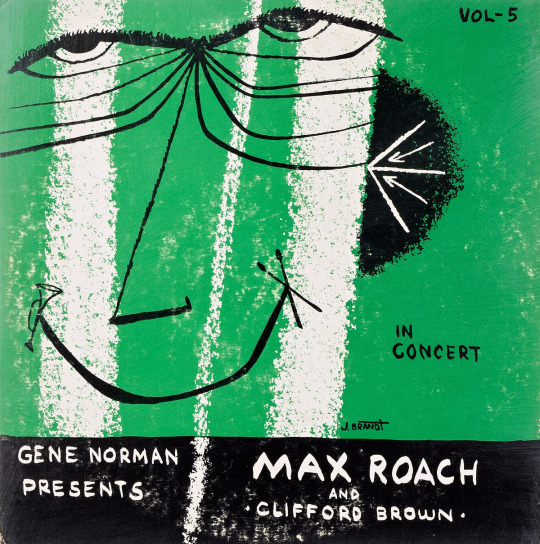
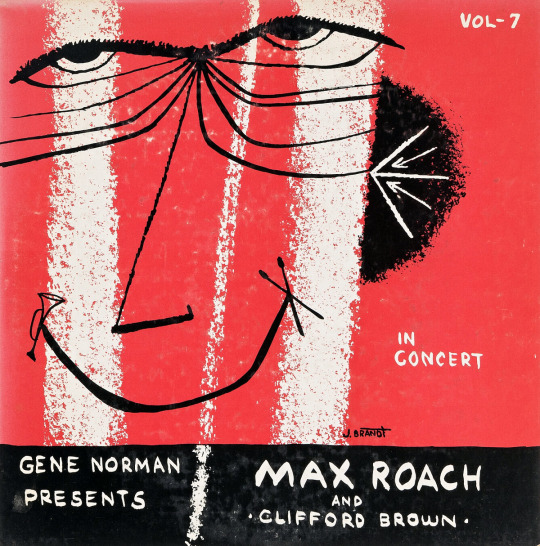
Gene Norman presents Max Roach and Clifford Brown in concert, Vol. 5 & Vol. 7, 1955.
Cover artwork by J. Brandt.
16 notes
·
View notes
Text
"Okay, what is wrong with you people?" "Will you just spare us the middle-class morality? It's not like they were brother and sister." - Hal Cooper, Clifford Blossom (all the dialogue from this scene is gold tbh)
"Slut shaming. It's what they call it when sluts get shamed." - Alice Cooper (iconic and beyond reproach)
"Alice Cooper - no longer lactose intolerant I see." - Hermione Lodge (been haunted by this line for six and a half years what the FUCK does this line mean)
"There's the sticky, dark, dirty truth. Maple syrup. Drown in it why don't you!" - Penelope Blossom (she's literally SO dramatic in this scene especially considering what we find out scenes later happened)
"I'm so sorry to interrupt your adultery, Fred." - Alice Cooper
"You remember our Homecoming, Alice?Hal? Back in the day? Your mom ever tell you about that night? ("Just that she and my dad were king and queen.") "Yeah they were - of hell." - FP Jones (this whole scene is also great but you KNOW this bitch thought he was so clever coming up with this little quip)
"I mean is there not a nice gay kid at your school?" - Tom Keller (#1 ally)
"I didn't realize that you were a polyamorist." "I don't think that's an actual word." - Alice Cooper, Mary Andrews
#this is only 8 but a few are two lines#in no particular order but i kept it to s1#i also know i forgot some obvious ones#parentdale#riverparents#hal cooper#alice cooper#fp jones#hermione lodge#clifford brown#penelope blossom#sierra mccoy#tom keller
20 notes
·
View notes
Photo

American trumpeter Clifford Brown
89 notes
·
View notes
Text
Donald Byrd: The Trumpet Maestro and Jazz Innovator
Introduction:
Donald Byrd, a name synonymous with brilliance in jazz, left an indelible mark on the genre as a virtuoso trumpeter, composer, and educator. Born ninety-one years ago today on December 9, 1932, in Detroit, Michigan, Byrd’s musical journey was nothing short of extraordinary. From his early days playing in the hard bop era to later embracing fusion and funk influences, Byrd’s…
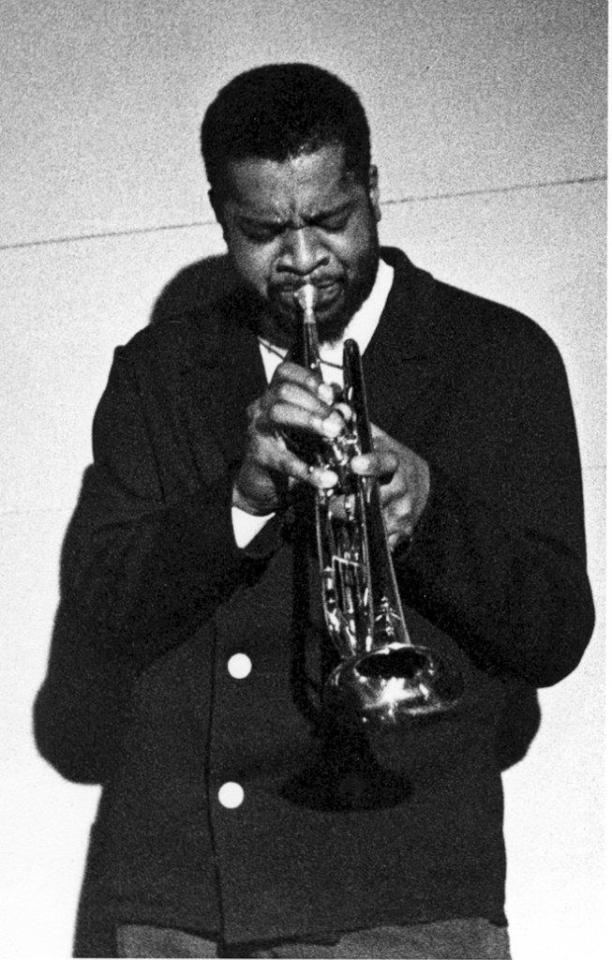
View On WordPress
#A New Perspective#Art Blakey#Art Blakey and the Jazz Messengers#Black Byrd#Byrd in Hand#Clifford Brown#Donald Byrd#Fuego#Gigi Gryce#Herbie Hancock#Horace Silver#Jackie McLean#Jazz History#Jazz Trumpeters#John Coltrane#Mal Waldron#Sonny Rollins#Thelonious Monk
10 notes
·
View notes
Text
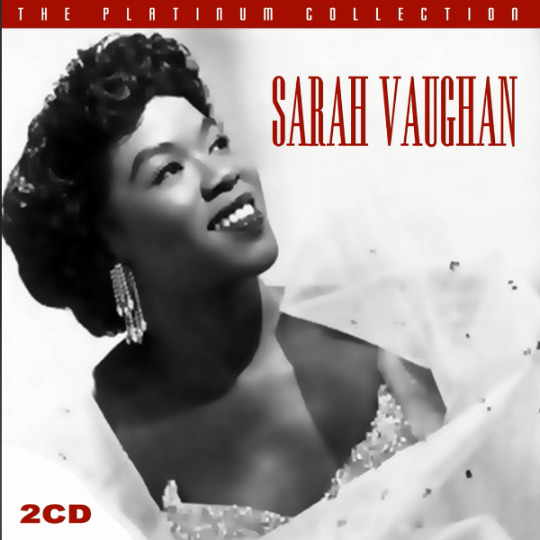
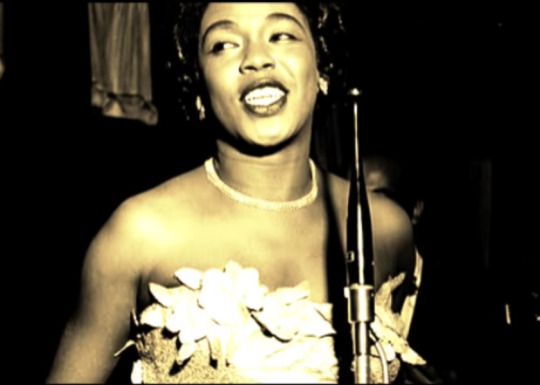


Sarah Vaughan with Clifford Brown - September Song
👇 🎼 👇
youtube
"September Song" is an American pop standard composed by Kurt Weill, with lyric by Maxwell Anderson, introduced by Walter Huston in the 1938 Broadway musical Knickerbocker Holiday. It has since been recorded by numerous singers and instrumentalists. It was also used in the 1950 film September Affair, and for the credits in the television series May to December (a quote from the opening line of the song).
Although the song was written as an old man's lament for the passing of his youth, some of the most famous versions have been recorded by women artists.
Thus Sarah Vaughan's version of 1955, and Ella Fitzgerald's with pianist Paul Smith on the 1960 Verve release Ella Fitzgerald Sings Songs From Let No Man Write My Epitaph are both regarded as Jazz classics. Eartha Kitt and Weill's wife Lotte Lenya both recorded the song in 1957, and Jo Stafford, Patti Page as well as Anne Shelton also recorded versions during the 1950s. In 1958 Eydie Gormé included the song in her album, Love is the season and in 1989 both Lena Horne in The Men in My Life, and Julie Wilson in an album of Kurt Weill songs.
Personally this song reminds me of waking up in on an early Saturday morning just as the sun starts to pierce through the window shade slits and the flowers outside with morning dew start to open up. As one eye slightly opens up and then the other followed by a fisted hand arm stretch and yawn… then Sarah starts to sing this song… oh so beautifully!
Sarah's accompanied by Leader/Arranger: Ernie Wilkins, Clifford Brown (trumpet), Herbie Mann (flute), Paul Quinichette (tenor), Jimmy Jones (piano), Joe Benjamin (bass), and Roy Haynes (drums). Recorded in New York, December 18, 1954. (EmArcy Records)
👄 👄 👄 👄 👄 👄
Comments 👄👄
👄One of the greatest of all voices. Nobody comes close to even copying her.
👄 This is one of the greatest version of September Song not only for Sarah Vaughan rendition but for Clifford Brown solo. It is epochal, this solo is one of the greatest trumpet solo in the history jazz.
👄 You're right on target. I've always felt that Clifford's solo is a perfect complement to Sarah's enchantment. Been listening to this for almost 50 years and it still makes my flesh crawl.
13 notes
·
View notes
Text
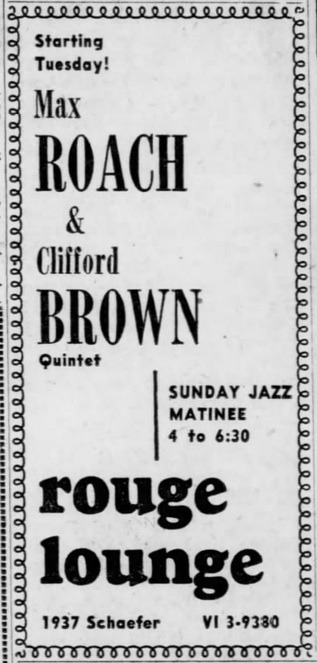
1956 - Clifford Brown-Max Roach Quintet - Rouge Lounge - River Rouge, Michigan
15 notes
·
View notes
Video
youtube
April In Paris, Sarah Vaughan
5 notes
·
View notes
Text
youtube
Polka Dots And Moonbeams - Sarah Vaughan with Clifford Brown
9 notes
·
View notes
Text
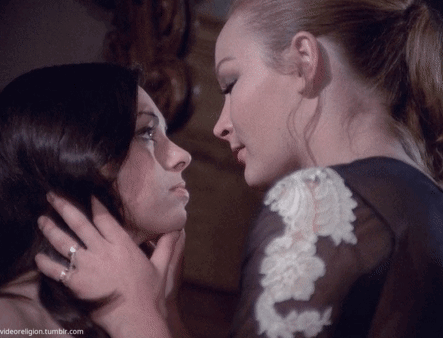
Happy #FrancoFriday !
Countess Perverse (1975)
#Countess Perverse#Jesús Franco#Clifford Brown#Jesus Franco Manera#exploitation film#sexploitation film#cult cinema#70s#gif#gifs#my gif#my gifs#jess franco#jess franco friday#franco friday
44 notes
·
View notes
Text
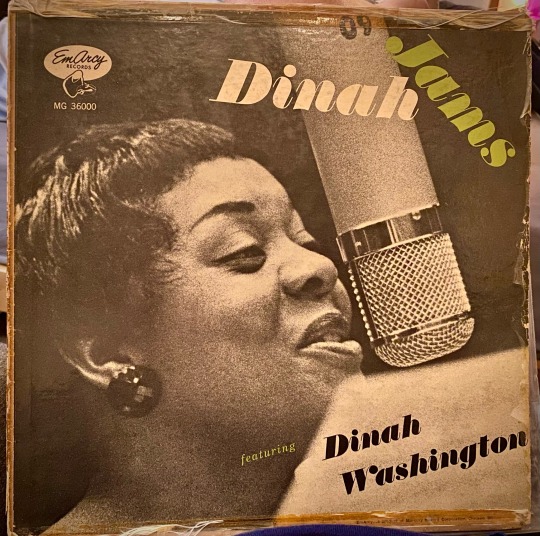
For a record that’s pushing 70 years old it does sound really nice…
13 notes
·
View notes
Text

If you can find this 1950s vinyl in the cut-out bin, grab it. The music is excellent. Purloined from my father’s collection, this is one of the first jazz LPs my brother Pete and I ever heard. We wore it out. And many decades later, I'm listening to it frequently again. It holds up.
https://www.discogs.com/release/1474375-Various-Jazz-Of-Two-Decades
#jazz#clifford brown#max roach#Sarah Vaughan#cannonball adderley#dinah washington#johnny hodges#coleman hawkins#charlie ventura#lennie tristano#joe turner#pete johnson
3 notes
·
View notes
Text
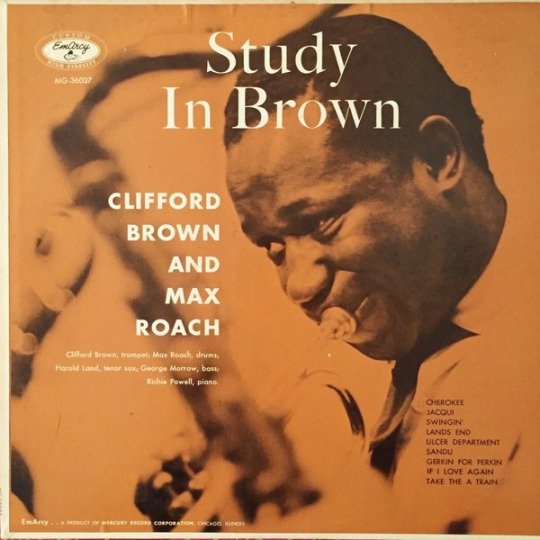
#131 - Study In Brown - Clifford Brown and Max Roach (1955)
What is time, and how do we perceive it? Why do some minutes feel longer on some occasions, but shorter on others? Why do 30 minutes feel much longer than an hour? In general, time is a very Lovecraftian concept within the scope of the universe. This intangible thing moves throughout our lives, changing the world and the aspects of the universe until it too dies out in its singularity, but even after death will persist in some form or another. We cannot see, we can feel, but we cannot know it on a first-hand basis. Time in music is also very important as it is the basis for many albums or songs that takes place in their length, however, it seems like different music genres, no matter if they have songs about the same length, one might feel longer or shorter than the others. A 2-minute pop song feels very short compared to a 2-minute jazz song. Why is that? Why do some musical styles feel longer than others?
Within my listening experiences with Study In Brown by Clifford Brown and Max Roach, I experienced a totality within this viewpoint, and with each listen I began to get accustomed to what this album had going for it.
My first listen went as follows. I decided to listen to the album in the comfort of my own home, wanting to listen to something jazzy, and something I haven’t heard before from a decade of music I am not quite as familiar with as I’d like to admit. I went with this album due to its interesting cover of Clifford playing a blurry, almost opaque-visioned trumpet, giving a weird scenery illusion that I doubt was intended, but well versatile within what the album made me feel. The first song of Cherokee felt incredibly long within its five-minute run time. I swear it went on for 20 minutes more than five, and this also applied to the other songs. The unglued sounds with Clifford’s trumpet combined with Max’s unforeseeable rhythm patterns created an auditory illusion for me, and while most jazz has a lot of these attributes such as frantic drumming and very uproarious instrumentations, the effect this record seemed to provide was almost unnerving with how it seemed to mesh time making it slower for no discernible reason other. I have felt as though I left the album satisfied, but bewildered at the same point. I decided the day afterward that I’d revisit the album once more, and each day after I’d hear it again and again, and each time while the effect of time never got prolonged in the record, it still felt massive within its short run time. Each time when it finished I began to question within the reality of my mind, why some things feel longer even after I became familiar with them.
Within my confusion, I started to think of hypotheticals of why this record may have this odd effect on my mind. Was it the time signature? The instruments? Just the vibe of the album? Each one got shot down every time I thought it through. How can a time signature affect my general sense of time other than affecting the time in the rhythm of the song? Instruments are merely the mass of an album, not the mass of time. Energy can have a play in time, but the energy is so frantic that the brain would’ve perceived it as faster than lofty. There had to be a reason, but I couldn’t know that reason due to Clifford Brown and Max Roach being dead and all. I had to get to the bottom of it, so I started searching. Many Google search responses never leave me in the right direction, most talk about new experiences, and while that is true that new experiences feel a lot longer than older ones, I have listened to albums quite a lot that by now it should’ve settled in my brain as this old noise that I have gotten familiar with, so yet why does it still feel so long? Then I found a clue within something I am next to, and that is the laundry machine. Say you stand next to a laundry machine and wait for it to stop so you time it to see how long it generally goes on. Normally laundry takes about 45 minutes to an hour length depending on how old or new the model and system are. Let’s say the laundry machine takes an hour before it ends. Have you ever noticed that it seems like it goes on for more than an hour, even when your timer says clearly it was an hour ago after you started the machine?
This laundry machine is reflected within this album, it feels long even when it isn’t. I then realized why this may be. You see, say you are playing a video game, and it is so fun but when you think you just started, suddenly it is 4 PM, and it is time to make dinner. While it might’ve felt like a solid few minutes since you started playing the game to when it became 4, in real time was still going on for hours, and hours may be short but they aren’t that short to not notice their totality. However, let’s say you are doing your homework, and it is just one page. As you go through, every minute feels like hours, but when you get done, in reality, it only took you 30-45 minutes to get it done, but it still felt exhaustingly long. How about when you go to a theme park and the visit feels so super long due to the anticipation of getting on the rides? How about when you take a shower, brush your teeth, comb your hair, put on deodorant, and get dressed and how it feels extremely short due to how mundane it is yet it probably takes you a good bit to fully complete each task. Why is it that things, even familiar ones, feel so much longer than they need to be?
The more I think I figured out my confusion, I always hit a brick wall, and even as I listen to this album while making this review, I cannot help but find that time went on for much longer. I am so confused about this album. How can it bend time and space to its whims? What does it mean, what does it mean? What is within the rhythms of Max Roach and the horns of Clifford Brown that elongate time to such a way that despite it going for the same amount of time, it all feels way longer to the chemicals within my brown? As the long song ends, I am still confused and bewildered. The blurry trumpet reflects what this album creates in my brain, within its notes creates these good songs, but more so a great mystery that I have no clue if science can decipher. This effect, this Study In Brown cements itself within the neurons of my brain, and despite my simple liking of what this album has musically, in its waking moments, I see it within my eyes, as this strange brain coliseum that each day I am fighting in, wrapping every little tiny detail I know into something that makes sense into what I may be experiencing.
Anyways yeah this album is pretty good.
4/5
4 notes
·
View notes
Text
Fats Navarro: The Trumpet Virtuoso of Bebop
Introduction:
Certain figures stand out in jazz history as virtuosos who left an enduring influence on the genre. Theodore “Fats” Navarro, a trumpet player whose brief but spectacular career left an indelible mark on the world of bebop, is one such luminary. Navarro’s trumpet expertise, trailblazing improvisational abilities, and influence on following generations of jazz artists have cemented…
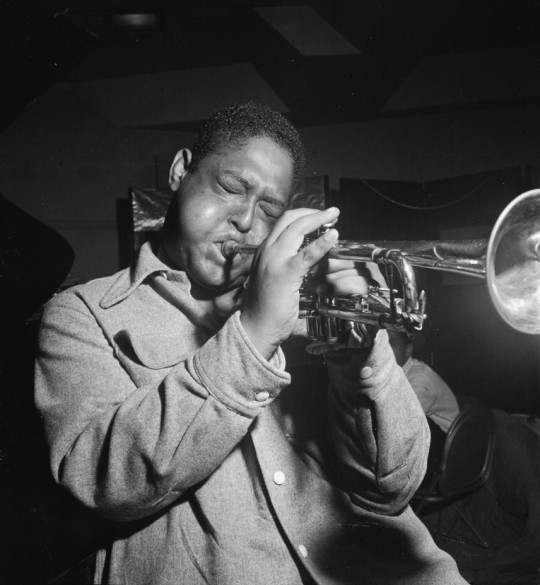
View On WordPress
#Bebop#Charlie Parker#Clifford Brown#Fats Navarro#Freddie Hubbard#Harry James#Jazz History#Jazz Trumpeters#Lee Morgan#Louis Armstrong#Roy Eldridge
8 notes
·
View notes
Link
Day #170: Today I Listened to ‘Embraceable You’ by Clifford Brown & Max Roach. We start with a 7-beat intro that promises more rhythmic experimentation than we actually get later on. Considering Max Roach is known for his drumming, I was surprised that this doesn’t feature any. All we get is a slightly louder guitar than usual and the faintest hint of a closed hi hat. I suppose this must have been in Roach’s string arrangement phase.
Speaking of, I was doubly surprised when the string arrangement came in. It really bridged the gap from big band to bebop and elevated the schmaltz-level of what could have been just another ballad.
5 notes
·
View notes
Text
6 notes
·
View notes